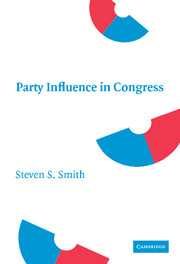Book contents
- Frontmatter
- Contents
- Acknowledgments
- 1 Introduction
- 2 The Microfoundations of Theories of Congressional Parties
- 3 The Types and Sources of Party Influence
- 4 The Search for Direct Party Effects
- 5 Recent Theories of Party Influence: Cartel and Conditional Party Government Theory
- 6 Revisiting Pivotal and Party Politics
- 7 Reexamining the Direct and Indirect Influence of Party in the House and Senate
- 8 More Than a Conclusion
- Appendix
- References
- Index
1 - Introduction
Published online by Cambridge University Press: 05 June 2012
- Frontmatter
- Contents
- Acknowledgments
- 1 Introduction
- 2 The Microfoundations of Theories of Congressional Parties
- 3 The Types and Sources of Party Influence
- 4 The Search for Direct Party Effects
- 5 Recent Theories of Party Influence: Cartel and Conditional Party Government Theory
- 6 Revisiting Pivotal and Party Politics
- 7 Reexamining the Direct and Indirect Influence of Party in the House and Senate
- 8 More Than a Conclusion
- Appendix
- References
- Index
Summary
We love to hate political parties in America. The parties in Congress, with their famous leaders and infamous gamesmanship, are particularly easy to dislike. In the view of many Americans, self-interest, not the public interest, motivates party behavior. Remarkably, the American Constitution is silent on the subject of political parties. Madison, Hamilton, and Jay argued in The Federalist Papers that parties were inevitable but their unfortunate effects would be minimized in a system in which governmental power is shared across two houses of Congress, a president, and a Supreme Court and across national and state institutions. Parties emerged quickly – even over the ratification of the Constitution. True to prediction, separation of powers and federalism limited party power, at least in comparison with parties that emerged in other democracies.
Legislative parties emerged in Congress's early years and were controversial from the start. They remain so. Critics dislike the way partisan considerations undermine genuine deliberation among legislators, generate conflict instead of finding a middle ground and building a consensus, and encourage gamesmanship and public relations efforts over real problem solving. Defenders insist that parties aggregate and lend order to the multiplicity of society's interests, provide a basis for organizing the large decision-making bodies of Congress, and create alternatives that give the electorate a basis for holding public officials accountable.
Critics and advocates of parties seem to agree on one thing – parties matter. That is, congressional parties affect policy choices by influencing the behavior of legislators.
- Type
- Chapter
- Information
- Party Influence in Congress , pp. 1 - 8Publisher: Cambridge University PressPrint publication year: 2007



